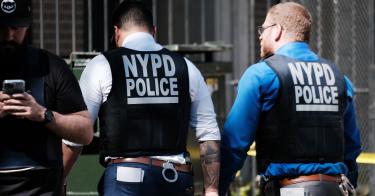When New York City police arrested South Sudanese diplomat Charles Dickens Imene Oliha after a woman accused him of rape, it raised the question: What exactly is “diplomatic immunity”?
Mr. Oliha allegedly propositioned the woman while she was walking her dog and then, when she refused, forced himself into her apartment and sexually assaulted her. NYPD’s Special Victims Unit arrested Mr. Oliha but released him when he said he was a diplomat. South Sudan’s Ministry of Foreign Affairs recalled Mr. Oliha and flew him home a few days later.
In TV shows and movies, characters get away with crimes by claiming “diplomatic immunity,” or say that they “are on American soil” when getting safely to a U.S. embassy. So does “diplomatic immunity” mean a foreign diplomat can commit a crime with impunity? Literally, get away with murder?
It depends.
>>> U.S. Leadership Needed to Push Back on China’s Abuse of Interpol
The answer is found in the 1961 Vienna Convention on Diplomatic Relations. (This is for civilian diplomats — Americans stationed at military bases in friendly countries like Japan or the U.K. usually fall under a status of forces agreement instead.)
Under Article 22 of the convention, “the premises of the mission [embassy or consulate] shall be inviolable. The agents of the receiving State may not enter them, except with the consent of the head of the mission.”
But, like much international law, the convention has no effective enforcement mechanism. In practice, the main thing stopping police or federal agents from going onto foreign embassy property is the principle of “you do it to us; we’ll do it to you.” There would also be the opprobrium of failing to honor an international agreement, though in 1979 that didn’t stop Iran from invading the U.S. Embassy in Tehran.
As to crimes, the convention says that a diplomat “shall not be liable to any form of arrest of detention,” and that he “shall enjoy immunity from the criminal jurisdiction of the receiving state.” So, yes, in theory, they can get away with murder.
However, crucially, “The immunity from jurisdiction of diplomatic agents and of persons enjoying immunity … may be waived by the sending State.” In other words, it’s not up to the individual diplomat to exert immunity, but to his sending country. If they think their guy should face justice, they can let him face the music.
Does the U.S. let its diplomats be tried in foreign courts? Not often. In countries where an official American is unlikely to get a fair or timely trial, the government’s default is to get them out, fast. Embassy staff involved in traffic accidents, minor drug offenses or non-deadly physical altercations sometimes leave their posts within a day. One exception was in 2011 when CIA contractor Raymond Davis shot two men at a traffic circle in Lahore, Pakistan. The matter was resolved two years later by a deal between the U.S. and Pakistan in which the case was handled in Sharia court, and the U.S. paid the dead men’s families over $2 million.
In August 2019, Anne Sacoolas, the wife of an American who worked on a Royal Air Force base, hit a young man, Harry Dunn, with her car while he was riding a motorcycle. The 19-year-old died. The U.S. asserted diplomatic immunity for Ms. Sacoolas and flew her home, refusing a British extradition request in January 2020 to try her for death by dangerous driving.
This January, the U.S. agreed for her to be tried by video link, but the case did not go forward. Meanwhile, Dunn’s parents sued Ms. Sacoolas in civil court in Virginia, settling for an undisclosed sum in September 2021. The case remains a small thorn in the side of the “special relationship.”
>>> Twenty-First Century Illicit Drugs and Their Discontents: An Introduction
South Sudan is the world’s newest country, barely a decade old. Born of a bloody civil war, it has been led by rebel warlord-turned-President Salva Kiir, who is in a perpetual feud with the senior of his five vice presidents, Riek Machar.
Corruption is rife and the rudimentary, oil-based economy is woefully mismanaged. In its decade of existence, foreign aid from the U.S., U.K. and EU has accounted for half of South Sudan’s budget.
For all those billions we gave them, the least South Sudan could do is allow Mr. Oliha to answer for the charges in New York. Although their government has promised “a full investigation from a specialized committee,” it is hard to see what they could accomplish with the alleged victim and any evidence far away in Manhattan.
Given the U.S. history of this type of case, the State Department is unlikely to pressure South Sudan to extradite Mr. Oliha. Chances are he skates.
This piece originally appeared in The Washington Times




